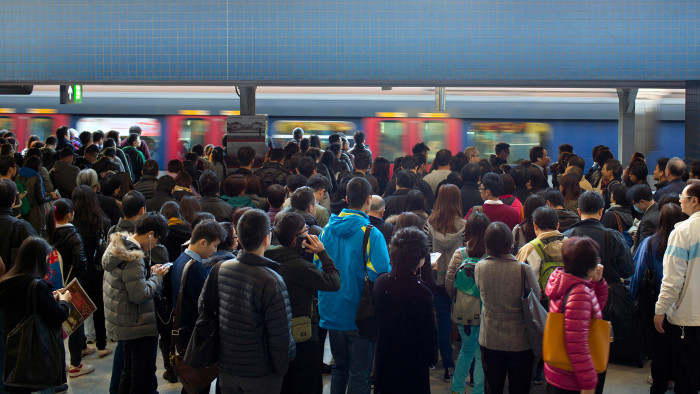Health programmes target Asia’s falling productivity

Roula Khalaf, Editor of the FT, selects her favourite stories in this weekly newsletter.
Asia may be sitting on a public health time bomb, as the effects of long working hours, poor nutrition and sedentary lifestyles threaten to create poorer health outcomes for workers than their western counterparts.
Alongside the burdens on employees of stress and lack of social support, employers face the prospect of coping with ageing workforces and the spectre of rapidly rising rates of obesity — with the attendant risks of diabetes and cardiovascular disease.
The AIA Healthiest Workplace survey, the second annual such exercise by research consultancy Rand Europe, funded by wellness programme AIA Vitality and backed by the FT, reveals high levels of mental and physical ill health. It also shows that the proportion of productive days lost per employee to absenteeism and presenteeism (when workers turn up but are ineffective because they are ill, distracted or unwell) is much higher than in the UK (see table below).
“Productivity loss is worsening in Asia. There is not necessarily a deterioration in mental health, because the indicators are broadly the same. But something is deteriorating in the working environment. People are reporting very little control in work, and are not sure of their responsibilities,” says Christian van Stolk, research group director at Rand Europe.
The data suggest that factors such as non-communicable diseases prevalent in the west (diabetes, for one), poor nutrition and more sedentary lifestyles are spreading rapidly in Asia. “We’re really building up huge public health issues very rapidly,” says van Stolk. “I don’t think we expected that and it has taken ministries of health by surprise too. The cost is huge, and employers are not set up to deal with that, whether public or private.”
Across more than 25,000 employees working for over 300 organisations in the five Asia-Pacific countries polled, the results for Hong Kong are particularly striking: employees there lost more than 30 per cent of their working time to absenteeism and presenteeism; in the UK, by comparison, the figure was less than half that. More than 12 per cent of respondents said they suffered from depression and nearly 40 per cent felt they had little choice in deciding what they did each day. Meanwhile, more than 21 per cent of employees in Hong Kong were obese (a body mass index of 30 or more). Overall, an average of 79 productive days per employee year were lost in the territory last year.
One important trend is the shift in the demographics of the workplace. Some of the Asian countries surveyed have rapidly ageing populations, creating pressure for more flexible working arrangements for staff who will need to take time off to care for elderly relatives.
The survey showed lower levels of engagement among younger staff, who suffer disproportionate fatigue and mental health concerns, such as depression. “Workplaces are not really set up for younger people,” says van Stolk. “Companies will have to wake up and adapt more quickly than western ones.”
Overall, Hong Kong ranked lowest for access to employer-provided wellbeing initiatives; more than a fifth of employers offered no interventions at all.
Hong Kong did not score worst for all aspects of employee health, however. Nearly 16 per cent of Australians in the survey reported drinking more than 14 units of alcohol a week, compared with fewer than 1 per cent of Malaysians and Sri Lankans — the lowest rates. However, Sri Lanka had the highest proportion of smokers, at 11 per cent. It also had the highest proportion of employees who reported at least one of the measured criteria for work-related stress (59.2 per cent). Sri Lankans, too, appeared most at risk of bullying in the workplace (31.4 per cent).
Workers in Malaysia reported the highest level of work absences annually and had the highest proportion who slept less than seven hours a night. They were the least physically active, had the lowest consumption of fruit and vegetables and the highest levels of blood pressure and cholesterol, and racked up the highest overall risk from lifestyle, clinical and mental health factors.
The figures need some scrutiny. The Hong Kong sample included a high number of employees who worked in the construction sector. In some countries, the ethnic origin of employees could affect risk factors that might have a genetic component, such as blood pressure and cholesterol. Whatever the risks, however, employers are responding, with examples of intensifying support across Asia, including in the health sector itself.
Rand Europe reports that it found an increase in employer interventions from last year and said about half of employers in the sample were now offering health screening services.
Kantima Lerlertyuttitham, chief human resources officer at Advanced Info Service, a consultancy in Thailand, says that since introducing wellness programmes, she has observed a 15 per cent reduction in sick leave and a rise in productivity. She also sees the need to respond to the changing expectations of her employees: “With the increasing number of health-conscious people, our organisation is facing a transition to new-generation employees who demand health benefits other than the fringe benefit of medical welfare.”
Comments